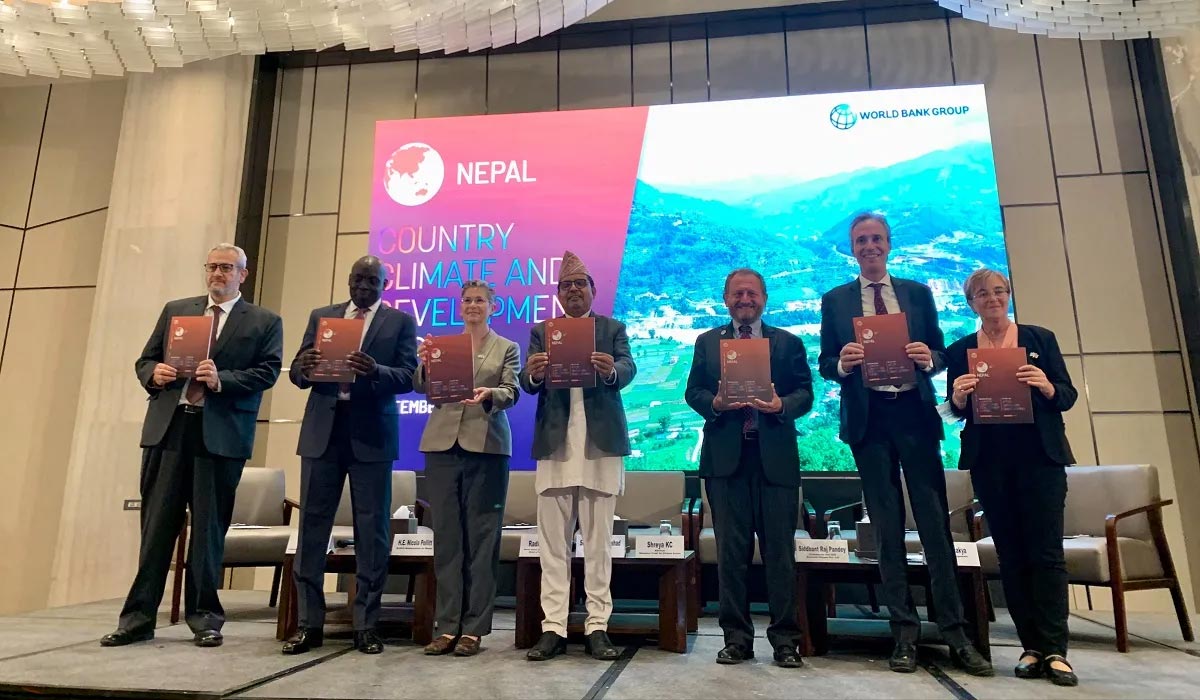
The World Bank Group has released the Country Climate and Development Report. The report released today pointed out the need to build climate resilience and gave various suggestions regarding policies and investments required for an integrated solution to climate and development to achieve green, sustainable and inclusive development.
According to the report, Nepal's supply chain, farmers, and urban residents are already forced to face the devastating effects of climate change such as floods and droughts. It has been warned that climate disasters in the future will endanger the long-term development of the country if no concerted efforts are made to build resilience.
According to the report, 'Climatic variability has become the main cause of food insecurity and poverty in Nepal as the southern region is affected by floods and heat stress and the northern region is affected by erosion, landslides, water pressure, and glacier overflow.' Internally, the gross domestic product of Nepal has been warned to decrease by at least seven percent due to this.
As the country's economy is growing, Nepal has to address the problem of greenhouse gas emissions and air pollution. Nepal's role in global climate change is negligible (about 0.1 percent of the total greenhouse gas emissions in the world), but the country's greenhouse gas emissions are increasing rapidly.
Nepal is one of the countries with the highest level of air pollution in the world. Carbon dioxide emissions from transportation, fossil fuels, and industrial activities have had a serious impact on human health and productivity.
According to Martin Reiser, Vice President of the World Bank for South Asia, as evidence continues to surface of the effects of extreme climate change due to increasing climate change, Nepal has reached a critical juncture where it needs to make its development path more sustainable, inclusive and resilient from future shocks.
He said, 'The good thing here is that the significant success achieved by this country in the field of community forestry and hydropower investment has become a strong foundation for climate-friendly development in the future.' Has expressed commitment to increase.
The World Bank has mentioned as an important event that Nepal adopted the concept of green, sustainable and inclusive development as a Country vision in 2021 in order to build resilience against climate change and other shocks that create obstacles to long-term green development and the development ambitions of the nation. Nepal's federal structure has placed the local government at the center of climate resilience and development efforts with major implementation responsibilities. In addition, it is mentioned in the report that the local government plays an important role in implementing the green, uplifting and inclusive development strategy.
This report proposes two tasks to help Nepal achieve its development goals by implementing climate change commitments. It has been emphasized that building resilience to the effects of climate change and finding low-carbon solutions, especially public and private investment in hydropower development and its export.
The report has highlighted the fact that women, indigenous tribes, and other marginalized groups are often deprived of mainstream development and are forced to bear the collective and widespread effects of climate change and disasters.
The report recommends adopting an integrated concept of water, agriculture, and forestry. The contribution of Nepal's agriculture sector and forest sector to the gross domestic product is 24 percent. Those areas are the main source of livelihood for poor people. The agricultural sector will be badly affected due to climate variability which will create excessive pressure on the forests, soil, water, and other natural resources of rural areas. In order to build resilience, the report suggests adopting a journey towards strengthening water resource management, climate-friendly agriculture, and sustainable forest management, including investment in water reservoirs.
Presenting the fact that Nepal is one of the countries with the most hydropower potential in the world, the report can help Nepal's own and neighboring countries with high carbon emissions to resolve carbon emissions. This report indicates the possibility of earning an average of US$ 200 million annually from electricity export in the period from 2022 to 2025.
It is said that hydropower development will also provide an opportunity to increase climate-friendly energy solutions such as electric transportation and green hydrogen, and be ready to use such opportunities. It has been pointed out that more work needs to be done to assess the impact of climate change on river flows, invest in supporting infrastructure needed for the growth of electricity exports, involve the private sector in this, and work continuously with regional partners.
Nepal is the most rapidly urbanizing country in South Asia. The report shows that cities here can benefit from climate change by providing innovation, job creation, and advanced services to urban residents. In order to take advantage of those opportunities, the report suggests investing in low-carbon transportation options such as urban sewage and wastewater treatment infrastructure, green and sustainable construction, electric transportation, and reliable public transportation. Due to climate change, it is estimated that the transport sector will have to pay a price equal to 250 million US dollars annually.
Notice




